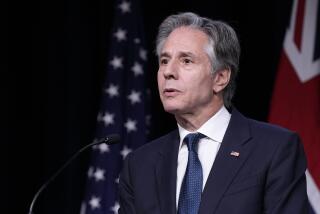Clinton Delays Shift of Embassy in Israel
- Share via
WASHINGTON — Eager to avoid upsetting Middle East peace hopes, President Clinton on Friday ordered a delay of at least six months in moving the U.S. Embassy in Israel from Tel Aviv to Jerusalem.
Clinton’s decision runs contrary to the wishes of many members of Congress, who favor relocating the embassy as a powerful sign of support for Israel’s claim to sovereignty over Jerusalem.
But the relocation would no doubt infuriate the nations that have resisted Israeli pressure to move their embassies to Jerusalem. The only countries that maintain embassies there are Costa Rica and El Salvador.
Congress passed a law by a wide margin in 1995 mandating the embassy move by the middle of this year. But lawmakers gave the president the power to postpone the transfer for national security reasons.
A White House statement issued in Cologne, Germany, where Clinton is attending a summit of the world’s leading industrialized nations, said the president invoked his waiver power “to protect our critical national security interests, most crucially in preserving the prospects for a comprehensive, just and lasting peace.”
The statement added that “at a time when there is real potential for movement in the peace process, and as we look forward to the start of those crucial negotiations, the United States should not be taking steps of its own that prejudge those negotiations and make them more difficult.”
Under the 1995 legislation, the administration would not have been able to draw further funds for diplomatic operations if Clinton had delayed the embassy move without invoking the waiver.
Sen. Daniel Patrick Moynihan (D-N.Y.), who co-sponsored the Jerusalem Embassy Act four years ago, reminded Clinton in a letter Friday that it remains the law. Congress decreed it was U.S. policy that Jerusalem should remain an undivided city and should be recognized as the capital of Israel, Moynihan said.
“I would strongly encourage you to take every appropriate measure to implement the letter and spirit” of the act, he told Clinton.
“I remain hopeful that the transfer of the United States Embassy to Jerusalem will be among your administration’s considerable contributions to a secure Israel at peace with her neighbors,” Moynihan added.
Palestinians, who claim East Jerusalem--the traditionally Arab side of the ancient city--as the capital of their future state, have said that moving the embassy would seriously harm the U.S. role as peace broker.
A top aide to Palestinian Authority President Yasser Arafat said the Palestinian leadership welcomed the decision to put off the embassy move.
“This is a wise decision which we appreciate and see as being in harmony with the signed agreements between us and the Israelis,” Palestinian Cabinet Secretary-General Atayeb Abdel Rahim said after the Cabinet’s weekly meeting in the West Bank city of Ramallah.
“We consider the attempts to move the embassy to be destructive to the peace process and believe the Clinton administration is showing concern about moving the process forward,” Rahim said.
Saeb Erekat, the chief Palestinian peace negotiator, said he hopes the attempts by members of Congress to persuade Clinton to move the embassy will now cease.
“It will only add to the complexities that already exist,” Erekat said. “We hope President Clinton will say openly and very frankly that this is an issue that will not be determined by the United States by any arm-twisting or lobbying.”
Clinton’s decision was not unexpected. Last week, Assistant Secretary of State Martin Indyk told members of Congress: “We feel very strongly that we should not take action that would preempt those [peace] negotiations or undermine them.”
In Jerusalem, a spokeswoman for Ehud Barak said the prime minister-elect, who is involved in intensive efforts to form a coalition government, will not comment on such issues before his government is in place.
Virtually all American Jewish organizations say the embassy should be in Jerusalem. But even some groups that for the last half a century have been urging the U.S. government to relocate its embassy admit privately that now might not be the time to force the issue.
The question of Jerusalem is perhaps the most sensitive of the issues put off for discussion until so-called “final status” negotiations under terms of the interim Israeli-Palestinian peace accords.
Those talks are expected to resume relatively quickly once Barak’s government is formed.
Public opinion surveys consistently show that a majority of Israelis, across the political spectrum, believe that Jerusalem should remain the eternal, undivided capital of the Jewish state.
Israel captured the eastern side of the city from Jordan in the 1967 Six-Day War and quickly annexed it. Most countries have never recognized Israel’s claim to all of the city and, like the United States, have kept their embassies in Tel Aviv.
Jackson reported from Washington and Trounson from Jerusalem.
More to Read
Sign up for Essential California
The most important California stories and recommendations in your inbox every morning.
You may occasionally receive promotional content from the Los Angeles Times.













